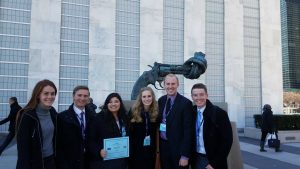The Pursuit of Justice and Healing in Peacebuilding
From the moment I set foot on campus as a college freshman, I knew this was the place where I would finally make good on my dream of becoming an author by majoring in English. College represented a chance to delve into the works of acclaimed poets, novelists, and essayists, and to hone my own writing skills and author’s “voice” by penning pieces of my own. As I finalized my class schedule for the first semester, I decided on a whim to take an introductory course on international development to diversify my schedule, although I had little previous exposure to international politics. This choice soon transformed my idea of both my future career and the world at large.
As I learned in the class about the status of human rights in countries worldwide, I realized that these rights are not fully guaranteed at any level of society. When my international development professor invited me during the following semester to work as a research assistant on a new faculty-mentored research project on women’s experiences in truth and reconciliation commissions (TRCs) around the world, I had the chance to co-author a recommendation report for Colombia’s 2018-2021 truth commission on best practices in the design, operations, and reporting stages. Throughout the project, I read over thirty TRC final reports containing account after account from survivors detailing firsthand the unspeakable violence perpetuated against them during violent civil conflict, and explored how governments had pursued transitional justice initiatives following these conflicts. I could not understand how people dehumanize others to the point of turning to largescale violence to resolve grievances between disparate groups, how governments could violently repress and commit mass atrocities against their own populations, how anyone could possess—let alone act upon—a sincere desire to deliberately and violently strip others of their dignity, safety, and wellbeing no matter their differences. As my conceptualization of violent conflict expanded to include forms of national-, community-, and individual-level violence beyond civil war—from domestic abuse to racialized policy brutality to psychological violence—I realized the systemic nature of the human rights abuses and decided that my life’s work needed to be focused on peacebuilding in order to fight against these harms and work alongside those around me and people worldwide to help build the social, political, and economic conditions necessary for everyone to live well, without fear, and in peace.
Throughout the twelve months spent working on the truth commission research project, I perpetually grappled with the tension between restorative and retributive justice. On one hand, restorative justice remains an essential component of rebuilding communities and restoring trust between opposing groups after violent conflict in order to ensure that individuals and groups can live together in peace and resolve future conflicts without violence. On the other hand, retributive justice offers a form of recompense for victims and survivors of conflict who do not wish to see perpetrators go unpunished, while also acting as a deterrent to future violent conflict by demonstrating to people who may be motivated to inflict future violence that impunity will not be tolerated. Given their seemingly opposing natures, are these forms of justice mutually exclusive? Can a country successfully implement both approaches in transitional justice efforts—and should it, depending on the local contexts? How can one even begin to ask, in good conscience, a survivor to forgive someone who has deeply harmed them and their families—and in many cases, to reaccept perpetrators into their communities and live alongside them? How can those leading national transition and reconciliation initiatives following civil conflict balance the needs and desires of survivors and communities who want differing types of justice while also designing approaches suited to mitigate and prevent future conflict? Who was I, someone who had never experienced this type of injury and pain, to recommend to truth commission members how to achieve both justice and reconciliation to rebuild their country and facilitate enduring peace?
While I tailored the rest of my college career around human rights work—from founding the campus Amnesty International chapter as a freshman in 2016 and serving as a delegate to the 2017 National Model United Nations (NMUN) conference in New York to co-founding a registered 501(c)3 nonprofit organization, Girls Lobby, in 2018 to teach Utah high-schooled-aged girls how to lobby their state legislators and interning at the Women and Foreign Policy program at the Council on Foreign Relations (CFR) in 2019—such endeavors did not involve transitional justice. Yet the topic remained top of mind for me, coming to the surface, for example, upon reading works such as Just Mercy by Bryan Stevenson, in which the author states that “each of us is more than the worst thing we’ve ever done,” and while watching white supremacists incite an insurrection last month at the U.S. Capitol. I pondered whether Stevenson’s statement is true, how this type of empathy could coexist with accountability for harms committed, whether a lack of empathy in turn dehumanizes the perpetrators of violence who originally dehumanized those harmed and the effects of this decision, and the unsettledness that immediately rose at the idea of being able to understand them enough to have empathy for them.

Outside the UN Headquarters in New York City by the Non-Violence, or The Knotted Gun, sculpture following the 2017 National Model United Nations (NMUN) Conference.
At Search for Common Ground (Search), I again had to face these tensions head-on—except this time, in the operational context of peacebuilding rather than the theoretical context to which I was exposed in college. Upon graduating with my B.A. in June 2020, the Scoville fellowship offered me an opportunity to work with Search, the world’s largest dedicated peacebuilding organization. Search blends programming with policy and advocacy work to advance peacebuilding globally through both grassroots initiatives with communities and institutional-level work with policymakers and decision-makers in various governments and multilateral institutions. All of Search’s programs and policy initiatives are driven and informed by the expertise of our local staff and partners, as 89% of staff members work in their home country. Search’s commitment to locally led peacebuilding positions our headquarters staff to connect local staff and people both directly and indirectly with policymakers in many countries, thereby avoiding “white savior”-based and neocolonialist approaches to international development. While at Search, I have been able to work on operationalizing Search’s 2018-2028 Global Policy and Outreach Strategy by identifying and developing engagement plans for both current and upcoming actors on the global stage to invite them to champion peacebuilding worldwide; writing a white paper for the Biden administration on non-military approaches to U.S. engagement with Afghanistan; writing a policy paper, based on consultations with local people in six conflict-affected countries, that outlines new principles that the international community should adopt to improve their involvement in creating inclusive, effective peace processes; creating a policy and advocacy M&E framework to better track our impact on various policy initiatives; and soon conducting educational outreach to Biden administration officials and Congressional representatives on WPS (women, peace, and security), YPS (youth, peace, and security), and peacebuilding as a legitimate tool of U.S. foreign policy.
During my second week at Search, the organization held a D.C. staff-wide discussion on impartiality, a core guiding principle of Search’s policy and programming work that enables them to work with multiple opposing parties to a given conflict by maintaining the trust of each given their promise not to discriminate against or privilege certain groups. Search incorporates this principle into their signature Common Ground Approach, which serves as the foundation for all of our work and seeks to “bring people together across dividing lines to understand each other’s differences, to celebrate their commonalities, and to work collaboratively around shared interests.” In this sense, Search views peacebuilding as “conflict transformation” by recognizing that conflict will always exist, but that it doesn’t have to be violent—we can learn how to resolve conflict nonviolently and use it to make positive change.

The University Church of St Mary the Virgin–one of many churches Matheson visited while studying abroad at the University of Oxford in England.
With this in mind throughout the insightful and honest conversation on impartiality, many staff members expressed their struggle with the apparent tensions between impartiality, neutrality, and justice. Some stated that impartiality does not preclude having a stake in the issue at hand, maintaining and acting upon one’s values, and being an activist in addition to a peacebuilder—unlike neutrality, which entails avoiding taking a position on the issue, as Archbishop Desmond Tutu explained when he said that “if you are neutral in situations of injustice, you have chosen the side of the oppressor.” One person shared that impartiality allows us to acknowledge everyone’s human dignity by letting them know that we do not condone the atrocities they have committed, but that they can change and we will support them in getting to that place, as Bryan Stevenson believes. Another suggested that we should reframe impartiality to more fully include multipartiality, which approaches facilitation work by acknowledging that “dominant narratives” and power hierarchies are present in any social dynamic. This includes noting that the “dominant narrative would affirm the experiences and voices of the dominant group members and further marginalize the experience of participants who hold identities that are often marginalized in [a given] society.” Accordingly, facilitators strive to be partial to everyone in the sense that they try to see themselves in each person’s position in order to honor each participant’s experience. However, this can prove difficult in situations where groups are so polarized that even recognizing the humanity of one group can be seen as taking sides. Still another staff member noted the need to talk more with our local staff about this to understand how maintaining impartiality affects them when they are intimately affected by conflict dynamics both professionally and personally. The conversation reminded me of the debate around restorative and retributive justice, especially concerning how to recognize perpetrators’ humanity while holding them accountable. In a recent public webinar, Search’s CEO addressed this issue directly: “Peace cannot exist without justice, and justice cannot exist without peace—you can’t advance one if the other does not advance. Peace is not just the absence of violence, but the presence of systems that prevent violence and enable communities to deal with their conflicts constructively at all levels.”
These thoughts gained real-world substance in a project I recently led with several of our country teams, who held consultations with local people in conflict-affected areas in six countries to gather their insights on what peace means to them, what peace should deliver, and who is involved and how. Their insights and recommendations will inform the creation of new international principles, determined by a panel of experts on conflict and peacebuilding, that the international community should adopt to better understand their roles and improve their involvement in creating inclusive, effective, and sustainable peace processes. Participants’ views of peace and transitional justice differed not only by their country and conflict contexts, but also by their individual intersecting identities. Throughout hundreds of nuanced interviews, many expressed a desire for some form of retributive justice in order to counter impunity, while many others emphasized the importance of restorative justice measures to strengthen social cohesion—sometimes including those who had also advocated for retributive justice methods. Their insights and recommendations were a testament to the power and necessity of locally led peacebuilding, as no outside actor could fully understand the multiple and varying forms of justice and healing that each person needed given their circumstances—and would need to embrace the practice of multipartiality in order to approximate such an understanding.
The world today continues to face many conflict-related issues and protracted situations of violent conflict, both domestically and internationally, that need the leadership of local people and international actors alike. As the Biden administration becomes a key global player in this world, these policymakers should invest in peacebuilding approaches that achieve both reconciliation and justice, which are vital to dismantle systemic injustice, transform conflict to prevent future violence of all types, and ensure lasting social cohesion and peace among deeply divided societies. While this is much easier said than done, peacebuilding offers a myriad of creative, effective, ethical, and sustainable ways to address deep-rooted conflict and should be taken seriously as a policy tool that achieves lasting, impactful results and mitigates harmful first-, second-, and third-order effects of international engagement in other countries. The administration should look to organizations like Search, in addition to other peacebuilding and development organizations that prioritize locally led peacebuilding, to pursue these approaches at the community and national levels through grassroots and institutional-level means as driven by the expertise and work of local people affected by the issues at hand. Locally led peacebuilding and development must become a core tenet of both U.S. domestic and foreign policy in order to help build genuine justice and healing in a manner well-suited for every community and nation.
Mallory Matheson is a Fall 2020 Scoville Fellow with Search for Common Ground.

